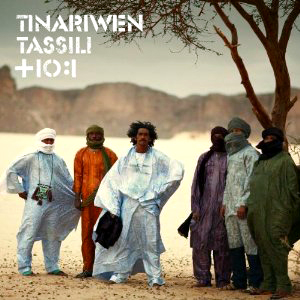There is something fresh and invigorating about listening to an album with vocals sung in a different language. Listeners can immerse themselves in the music as a whole, with vocals and instruments combining to form one organic musical environment. Many music fans have discovered this through Icelandic band Sigur Rós, and many more are about to discover it via “Tassili,” the new album from the Malian ensemble called Tinariwen.
With “Tassili,” Tinariwen, made up of members of the Tuareg people, has crafted an earthy, raw and surprisingly catchy hour’s worth of music.
Two musical elements define most of “Tassili”: exceptional acoustic guitar and group vocals. Most songs on the album feature an acoustic guitar played in such a raw manner that it immediately forces listeners to drop their guard. From that moment on, exotic guitar riffs that can be simultaneously sharp and delicate become the norm.
The vocals on “Tassili,” often sung in a group, are another highlight of the album. The men singing on the album do not necessarily sound like they are classically trained. Lyrics are sung in an undulating and throaty tone that at times borders on humming. But combined with the acoustic guitar and set to the rambling pace at which almost every track is played, the vocals shine.
The album’s pace, while a strength within individual tracks, turns into a weakness when listened in its entirety. Every song is played at more or less the same tempo. At times, this renders the album tedious.
But Tinariwen brings in guest stars on several tracks who breathe new life into the music. Nels Cline of Wilco, Kyp Malone and Tunde Adebimpe of TV on the Radio and the Dirty Dozen Brass Band all provide excellent work and add new elements to songs that can be a bit one-dimensional.
Wary listeners may be surprised that much of the album is genuinely catchy and quite accessible, in spite of the language difference. “Imidiwan Ma Tennam (feat. Nels Cline)” is the first and catchiest song on “Tassili.” Once the second chorus hits, listeners may find themselves singing along.
“Tameyawt” is an acoustic ballad that will surely tug at heartstrings with its raw but delicate guitar work and vocals that are sung in a voice seemingly filled with longing and pain.
The album closes with “Swegh Attay,” a 10-minute finale that is made up of two separate songs. One is a slightly upbeat group number that could easily be the final song in an epic movie, and the other is a somber ballad that is just as powerful.
There is no doubt Tinariwen’s “Tassili” may be out of some listeners’ musical comfort zones. Those who take a chance on the album, however, will find themselves rewarded by a rich and complex set of songs that feels intimate despite the language barrier between band and listener.
Email Bain at abain@media.ucla.edu.
